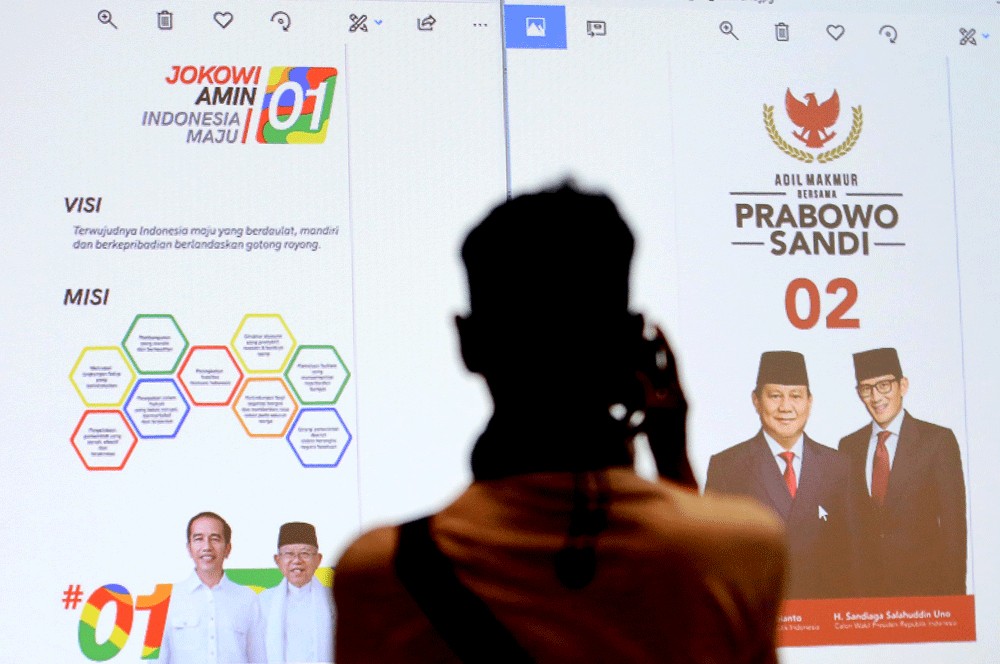Popular Reads
Top Results
Can't find what you're looking for?
View all search resultsPopular Reads
Top Results
Can't find what you're looking for?
View all search resultsWho benefits from economic nationalism?
Change text size
Gift Premium Articles
to Anyone
I
ndonesia’s presidential candidates have been stepping up their campaigns. Much like in 2014, each camp claims strong nationalist credentials when it comes to the economy. Back then Prabowo Subianto set the nationalist tone and Joko “Jokowi” Widodo was often viewed as the more liberal, technocratic type on economic questions.
What has changed this time around? When it comes to Prabowo, the answer is — not much. Prabowo is using exactly the same nationalist playbook as he did in 2014. He claims Indonesia’s current economic system is based on “the economics of stupidity” because of the privatization of lands by foreign investors and the country’s dependence on loans.
In his 2017 book, Paradoks Indonesia (Indonesian Paradox), he argued that despite being a resource-abundant country, Indonesia has experienced an “outflow of national natural resources” because of mismanagement, wrong economic direction and defective elites. He reassures his constituents he could make Indonesia “stand on its own feet” by relying on its national wealth to be self-sufficient (swasembada) and independent of foreign oppression.
He reiterates food imports would destroy the people and weaken the economy. Yet, his target audience for this narrative is hardly identified.
None of Prabowo’s anti-colonial, anti-imperialist and protectionist themes are new. He has consistently used these topes since the 2014 election by condemning foreign actors who were draining Indonesia’s wealth, a characteristic that Australian scholar Edward Aspinall called the “new nationalism”.
However his running mate, Sandiaga Uno, has given a more nuanced view. Sandiaga has been more pragmatic in talking about the economy, even expressing openness for foreign investors and the private sector in Indonesia’s economic growth, especially in the infrastructure and energy sectors.
Sandiaga’s pragmatism in the Prabowo camp is mainly for balancing his running mate’s narrative on the economy. Still, Sandiaga supports the big idea of self-sufficiency and domestic capacity for supplying commodities. He focuses more on domestic economic challenges, such as high commodity prices and a lack of job opportunities, which is aimed at women and the millennials. Yet, the fragmented narrative in Prabowo’s camp is a tricky situation because it makes its narrative inconsistent.
What about Jokowi? It seems that Jokowi was sensitive to claims back in 2014 that he was not nationalist enough and now both his presidency and his campaign have been marked by assertive nationalism.
During his first term in office, Jokowi laid the groundwork to ensure that by 2019 he had kicked plenty of nationalist goals. In December 2018, after three-and-a-half years of negotiations, the government finally declared it had acquired the majority (51 percent) stake in the PT Freeport Indonesia gold mine. Jokowi also directed the state-owned oil and gas company, Pertamina, to acquire the Mahakam gas block in Kalimantan and the Rokan oil block in Riau back on Jan. 1 and July 31 respectively.
Through his social media account, Jokowi expressed his gratitude and commitment “[…] to strive for the national sovereignty of the country’s natural resources through the state’s control of oil and gas”.
These achievements have become a useful tool for Jokowi. For example, when the opposition’s camp accused Jokowi of being pro-foreigner, he defended himself by citing his achievements in retrieving the assets of Indonesia’s natural resources. On Chinese migration, Jokowi claimed that China hosts more than 80,000 Indonesian migrant workers, while Indonesia hosts only 24,000 Chinese workers.
As Australian professor Greg Fealy says, Jokowi has also been establishing the reputation needed to prove his nationalist credentials through economic growth and rapid development.
Jokowi’s nationalism, while assertive, often has a defensive ring to it and looks like a political tool to insulate himself from Prabowo’s aggressive and divisive nationalist attacks, in case they affect his popularity.
However, how much do Indonesians actually care about nationalizing the countries resources? A survey by the Institute of Southeast Asian Studies in 2017 indicated that people consider the most important issues facing Indonesia today to be corruption, economic management and growth, infrastructure and transportation.
So whose nationalism are the candidates fighting for? Are their narratives on economic nationalism useful for overcoming these vital economic issues? Eventually, Indonesians need to be convinced by the candidates’ blueprints for the next five years, instead of by superficial debates on who is the most nationalist man in the room.
***
The writer is a research officer at the Indonesia Studies Program, ISEAS – Yusof Ishak Institute, Singapore.











